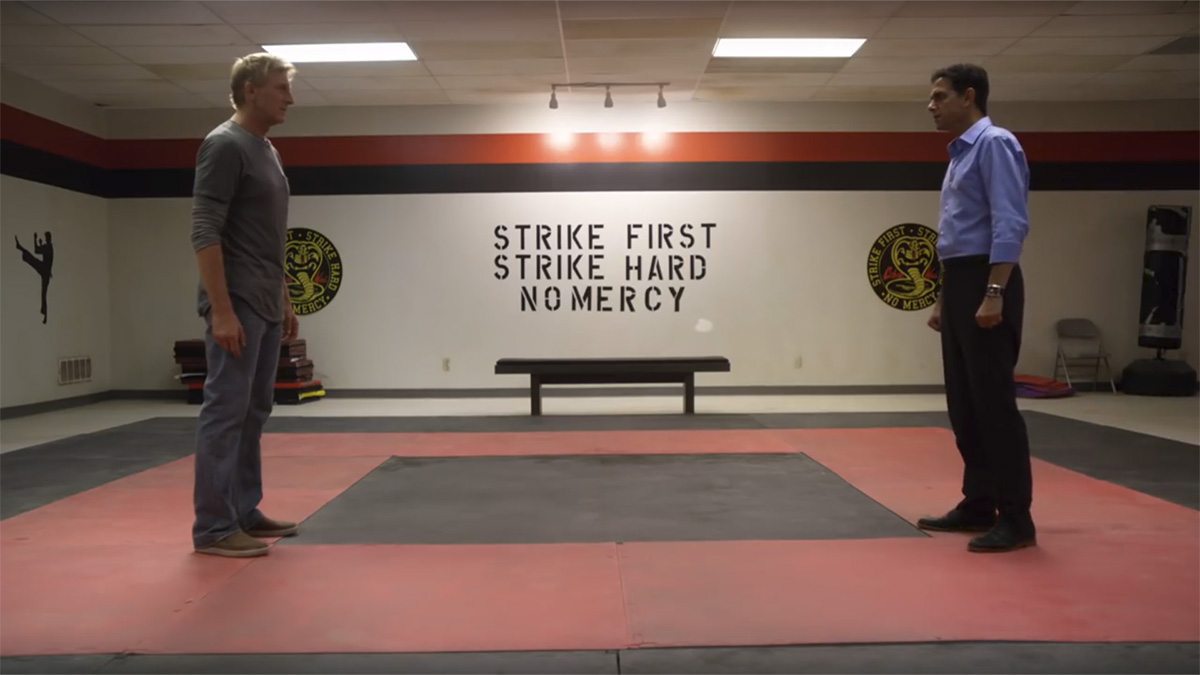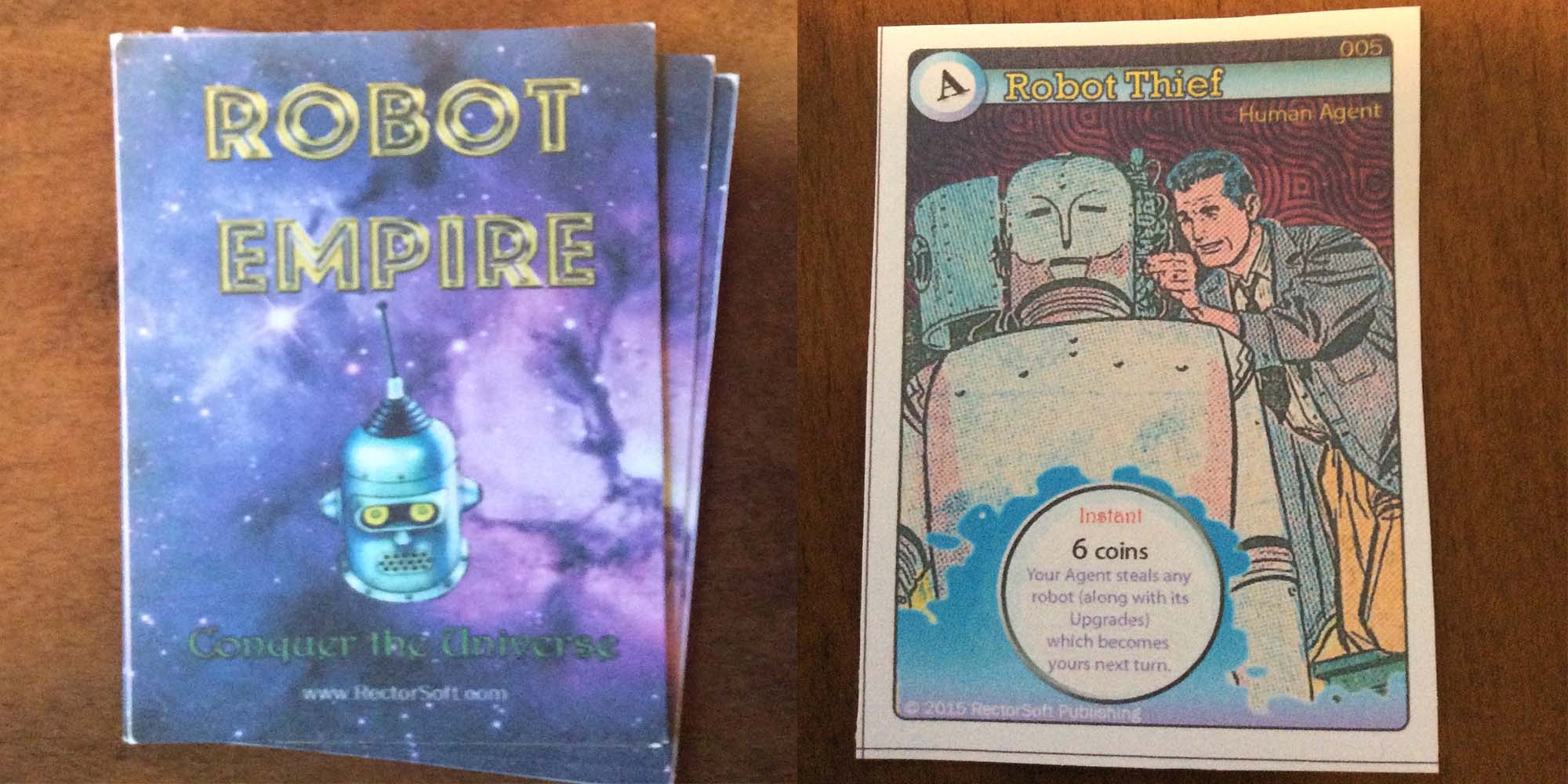Disney’s The Finest Hours tells the true story of the most daring sea rescue in Coast Guard history; in 1952, in the middle of one of the worst storms ever to hit the East Coast, an oil tanker broke in half. More than 30 survivors worked feverishly to keep the half-ship afloat long enough to be rescued, while four men in a 12-man boat searched for the ship among 70-foot waves.
Recently, I had the opportunity to take part in a roundtable conversation with the cast and director of the film. Chris Pine (Star Trek), Ben Foster (Six Feet Under), Holliday Grainger (Cinderella), Casey Affleck (Interstellar) and director Craig Gillespie (Million Dollar Arm) answered questions and shared behind-the scenes stories.
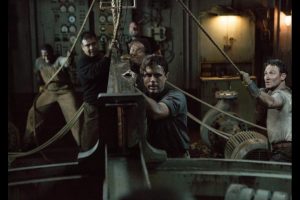
Photo © Disney.
Most of the film was shot in a giant pool constructed for the film, and the cast spent their days drenched in cold water.
CASEY AFFLECK: That was a cold and wet set, the days were cold and wet, and I think that it’s the kind of thing that if you have to get used to it, then you become hooked on it a little bit. You become, I was, by the end I really kind of liked it. I didn’t like a day off, because I wanted the punishment of being pounded with freezing cold water. Water so cold that there was a day when it didn’t work because it had frozen solid in the pipes.
CRAIG GILLESPIE: There was a bit of a rivalry between the Pendleton crew and the 36500 crew, on who was getting it worse. Josh Stewart had a miserable day one day, he was doing that scene out on the deck, in a t-shirt, and it was just brutally cold… I think he sort of took the trophy for that.
BEN FOSTER: You get to know somebody pretty quickly, when you’re sharing proximity for four months under a fire hose.
The actors and director were all attracted to the project by the script.

Photo © Disney.
GILLESPIE: I started reading it, and Scott Silver had worked on the draft that I read; he wrote The Fighter, and he had such a visual style of writing, and such a restraint with his characters that I immediately saw this world that he created, and then the story in itself is just astounding. One of the first questions had was, did this actually all happen? And it did. I grew up on the water in Australia, so I have a very visceral response to it, and there’s a rhythm, the way the ocean works, and being able to see a script where I could actually utilize that, was exciting as well.
FOSTER: With film I find, historically, 40% of the script can go. So many scripts are over-written, and what I was so taken by with this particular script was that it wasn’t that over-written. It was actually a really beautiful, concise, simple story, the dialog felt very true and lived-in.

Photo © Disney.
CHRIS PINE: This was a great script, and a really interesting character, and I just loved seeing this soft sweet man, and I just loved reading him. He was just really a gentle spirit, and, I don’t know, I was just really attracted to seeing a character like that go through these hard experiences, rather than someone that you might expect to win at the end of the day; I wanted you to see somebody who is wracked by fear, just as many of us are. He just seemed very, very normal, so I enjoyed that.
The Finest Hours tells the story of ordinary people doing extraordinary things, displaying strength and courage without bravado. The last two surviving crew members, Andy Fitzgerald and Mel Gouthro, visited the set during filming.
PINE: They’re 80-something years old now, and the only survivors of that little group. I think they were just stunned that Hollywood cared, that anyone cared. I don’t think they really cared. I mean, the beauty of these guys, I’m telling you honestly, is, without hyperbole, Andy didn’t tell his wife until three years after they were married. And the only reason why he told her anything was because she asked. I mean, these men, this was their job. Just like we go in every day and play make-believe, these guys go in and save lives; some days it sucks and it’s boring, and some days they save people’s lives, or spend days painting boats, and that’s just what they did. It just speaks to a quality of human being that, y’know… all of us go to the Golden Globes and we get our picture taken; not those guys.
GILLESPIE: To have them there, it reinforced for me, the way we were portraying these guys. They were so humble about what happened. He mentioned that he hadn’t told his wife till three years after they were married that this had happened. It’s like they did it and they moved on, and it didn’t seem like that big a deal to them. It was what was expected. That was their job. They knew the reality of it, and the risks involved, that they could die. It’s true, the year before, it’s mentioned in the film, that eight men died trying to rescue this fishing boat, which is something that Bernie’s carrying with him. So they were familiar with death.
AFFLECK: I didn’t talk to them that much; they were there, and you know, when people visit the set, they would be sitting off in some dry warm corner, and you’d be on a ship and sopping wet and stuff, and there wasn’t a lot of hanging around and socializing in that way. But I did meet them, and they seemed really pleased, which was nice, they didn’t seem sort of worried about it at all, they thought is was sort of amusing that this was all happening.
The cast spoke about the challenges of portraying real people, and the research they did in developing their performances.
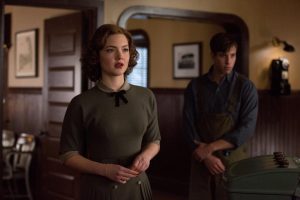
Photo © Disney.
HOLLIDAY GRAINGER: I met Patty, Miriam and Bernie’s daughter, and she introduced me… I took this trip to Chatham, hoping that I could record some girls to kind of get the accent, but it’s so different there now, it’s like it’s so, it’s like a middle-class holiday town, so no one really has the regional accent. So these girls I was going up to, I’m thinking in the local bars there’s got to be someone, but there wasn’t really. And so Patty took me to meet a woman that was, I don’t know how close a friend she was to Miriam, but she was a contemporary of Miriam and Bernie’s, their families definitely knew each other. She wasn’t from exactly the same area, but it was kind of the idea of that accent, and she really helped me characterize Miriam. She was like, she had her hair and makeup and her pearls, and she was very well presented, but she had a steel. It was the presentation, hospitable, very ladylike, but as soon as she got talking, the stories she told, I was like “that’s her.”
AFFLECK: I didn’t feel too much pressure, because, frankly, he’s not with us anymore, and his family, there didn’t seem to be anybody really reachable who knew him, we didn’t have much information on him, so it felt like it had to be an invented personality in some way, so you get to make things up instead of feeling burdened by the reality of somebody else’s life. But I did like the character that had been written, and that Scott Silver had talked about, and that Craig then talked about, and it just sort of grew and grew into something I thought was interesting and would be fun to play, amidst the kind of, all the noise and effects of the movie, to do someone who’s more cerebral and calm and sort of centered, and sees this life-and-death situation as a puzzle, not a threat.
PINE: I had a little audio recording of Bernie, he had an interview with some small-town newspaper many years after it happened, and it’s like 15 minutes and he just goes by the book, minute one, minute two… it’s a lovely insight into the man, it’s my only, that and some pictures were really all I had. And all I wanted, quite honestly, and he had a wonderfully lackadaisical, or, measured cadence. Just a very… there’s no embellishment, he was quiet, succinct, he talked about God, family, and the boat. It just gave me a great insight into Bernie. For me, my job, I’m an actor, hired by a director, to tell a story in 110 pages. That was my job. The character on the page is my job. And I, if I can glean some things that are worthwhile to help me tell this narrative, then I’ll do that, but I’m not doing an impersonation of a human being. I’m not, this is my fictional representation of a character named Bernie Webber, that did this job that night, but I don’t know the man, I didn’t speak with his family… I need to serve that, and I need to serve my actors and I need to serve my director and the author, and that’s, for me, what’s most meaningful, worthwhile and most productive.
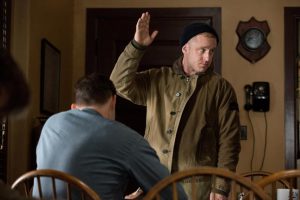
Photo © Disney.
FOSTER: I suppose in the arc of a film, and — spoiler alert, 32 guys come back, it is a successful rescue mission — and watching this guy [gestures toward Pine] evolve; I can’t say the man that I portray has a terrific arc, he’s a guy in a boat. He’s a fellow, Richard Livesey, in this particular movie, he’s a tried and true man of the sea. But watching him work, getting to stand next to Chris every day and watching him build these nuances of an underdog, of a guy who doesn’t expect to be a winner or even do that well, who just wants to do okay, become a hero, was just a thrill as a fellow actor. Just to pay witness and to participate in that is… it’s playing jazz, it’s participating and watching a musician you really respect, and that was the most fun for me.
The relationship between Bernie and Miriam is a unique one; in the film, she proposes to him. Grainger filled in some of the background.
GRAINGER: I’m not sure that the real Miriam actually proposed, like was actually “will you marry me?” But there was definitely a very parallel kind of scene in which Miriam and Bernie, rather than waiting to get in the car, they were in a car, and she wouldn’t get out until he agreed to marry her. So that’s a tale that they told as a couple then. So it’s definitely like very strong parallels in the beginning of the relationship. She worked at the telephone office, and overheard one of his conversations with someone, and called him, so they started speaking on the phone for months before they met.
 FOSTER: What’s exciting is, in this world of Twitter and Facebook and everybody’s presenting their lives as a movie, as their own f***ing commercial, this movie hearkens back to a time of an emotional courage, a spiritual courage, and a work ethic which has an economy to it, a simplicity to it, a classic fabric of what being a hero is about. It’s not about saying [applauds] ‘look what I did, look how great I am’… it’s… that’s your job. And there’s not much more to say.
FOSTER: What’s exciting is, in this world of Twitter and Facebook and everybody’s presenting their lives as a movie, as their own f***ing commercial, this movie hearkens back to a time of an emotional courage, a spiritual courage, and a work ethic which has an economy to it, a simplicity to it, a classic fabric of what being a hero is about. It’s not about saying [applauds] ‘look what I did, look how great I am’… it’s… that’s your job. And there’s not much more to say.
PINE: When Andy and Mel came, and, um, you learned to shut up really quickly. There’s not much to complain about. Ben was saying, men and women, all over the world, every day, in our communities, that help to serve and protect; there are firemen and EMTs, there’s teachers that help raise kids, there’s Marines abroad, there are Naval officers abroad, I mean, people do this for a living. What we do is come in and play make-believe, and hope to make a story that resonates with people, so people know that doing good and doing right, and doing good and right without getting a pat on the back, is good and right.
The Finest Hours opens Friday, January 29.


